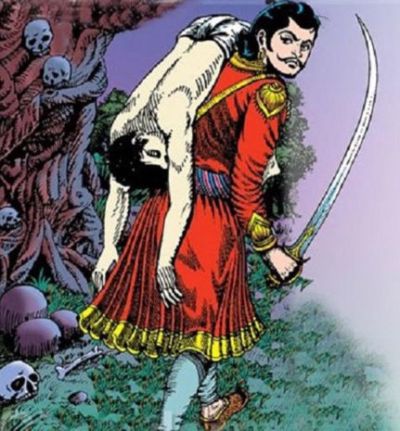“So tell me, o King, to which hand should the king offer the pinda-dānā? And what did this all mean?“
“Remember, if you know the answer, and don’t tell me the truth, your head will burst into a hundred pieces!“

इति वेतालतः श्रुत्वा मुक्तमौनः स भूपतिः ।
तं त्रिविक्रमसेनो ऽत्र धर्मज्ञः प्रत्यभाषत ॥ १२,२६.९५ ॥
चौरस्य हस्ते दातव्यः स पिण्डः क्षेत्रजो यतः ।
चन्द्रप्रबः स नृपतिः पुत्रस् तस्यैव नान्ययोः ॥ १२,२६.९६ ॥
विप्रस्य जनकस्यापि स हि पुत्रो न बुध्यते ।
विक्रीतो हि धनेनात्मा ताम् एकां तेन यामिनीम् ॥ १२,२६.९७ ॥
राज्ञः सूरप्रबस्यापि संस्कारादानवर्धनैः ।
भवेत् स पुत्रो न स्याच् चेत् स्वधनं तस्य तत्कृते ॥ १२,२६.९८ ॥
शिशोस् तस्य हि शीर्षान्ते मञ्चस्थस्यैव हेम यत् ।
न्यस्तम् आसीत् तद् एवास्य मूल्यं संवर्धनादिके ॥ १२,२६.९९ ॥
तस्माद् धस्तोदकप्राप्ता तन्माता यस्य येन सा ।
अज्ञा तज्जनने दत्ता यस्य तन् निखिलं धनम् ॥ १२,२६.१०० ॥
तस्य स क्षेत्रजः पुत्रश् चौरस्यैव महीपतिः ।
पिण्डस् तस्यैव हस्ते च देयस् तेनेति मे मतिः ॥ १२,२६.१०१ ॥
इत्य् उक्तवतो नृपतेस् तस्यांसात् स्वपदम् एव वेतालः ।
प्रययौ स च त्रिविक्रमसेनो राजा तम् अन्वयाद् भूयः ॥ १२,२६.१०२ ॥
King Vikram, who was well-versed in the laws of Manusmriti and the administrative sciences, broke his silence and replied…
“The pinda-dānā should have been offered to the hand of the thief, for Candraprabha was his son, born in the ‘Kshetra’ (field) belonging to the thief, and no one else.”
“The Brāhman Manaḥsvāmin begot him, but he cannot be considered the father, since he sold himself for money on that night.”
“However, he might have been considered the son of King Sūryaprabha , because the latter had brought him up, fed him, educated him…but only if he had not received a price for this. However, the gold that had been placed in the cradle had been accepted by Sūryaprabha, and hence this was considered the price paid for the services rendered.”
“He, in whose hand, the hand of his mother was offered,
and by whose permission Candraprabha had been conceived,
and whose entire wealth had been given to the mother,
by which money the Brāhman’s night had been bought,
that man rightfully owned the kshetra of the girl,
and that man was the thief, and hence the true father of Candraprabha.
As the king uttered these words, the Vetāla flew off his shoulder, laughing. And King Vikram once more started to walk towards the banyan tree, determined to fetch him.
to be continued…
A woman’s womb was considered to be the ‘kshetra’, (loosely translated to mean field), when the seed of man is sown, and the child is born.
A man who marries a woman through the proper Vedic rites is usually the ‘owner’ of the wife’s kshetra.
However, if the girl or her family pays him money or material (dowry) for the seed he sows, then he is not considered the rightful husband, or the rightful owner of the kshetra.
He does not get liberation through the acts of the ‘son’ who is born thus.
Manaḥsvāmin was paid for his services, and so he wasn’t considered the father.
The thief, on the other hand, gave his entire wealth to his wife, and thus owned the kshetra, as he paid for her and the child’s maintenance.
The king was also not the true father. While he brought the child up and educated him, he too accepted the gold that had been offered and so only acted as a caretaker, and not the owner of the kshetra. If however, he had not accepted the money, the king may have been considered and the true father.
